
- Bioactive Compounds
- By Signaling Pathways
- PI3K/Akt/mTOR
- Epigenetics
- Methylation
- Immunology & Inflammation
- Protein Tyrosine Kinase
- Angiogenesis
- Apoptosis
- Autophagy
- ER stress & UPR
- JAK/STAT
- MAPK
- Cytoskeletal Signaling
- Cell Cycle
- TGF-beta/Smad
- Compound Libraries
- Popular Compound Libraries
- Customize Library
- Clinical and FDA-approved Related
- Bioactive Compound Libraries
- Inhibitor Related
- Natural Product Related
- Metabolism Related
- Cell Death Related
- By Signaling Pathway
- By Disease
- Anti-infection and Antiviral Related
- Neuronal and Immunology Related
- Fragment and Covalent Related
- FDA-approved Drug Library
- FDA-approved & Passed Phase I Drug Library
- Preclinical/Clinical Compound Library
- Bioactive Compound Library-I
- Bioactive Compound Library-II
- Kinase Inhibitor Library
- Express-Pick Library
- Natural Product Library
- Human Endogenous Metabolite Compound Library
- Alkaloid Compound LibraryNew
- Angiogenesis Related compound Library
- Anti-Aging Compound Library
- Anti-alzheimer Disease Compound Library
- Antibiotics compound Library
- Anti-cancer Compound Library
- Anti-cancer Compound Library-Ⅱ
- Anti-cancer Metabolism Compound Library
- Anti-Cardiovascular Disease Compound Library
- Anti-diabetic Compound Library
- Anti-infection Compound Library
- Antioxidant Compound Library
- Anti-parasitic Compound Library
- Antiviral Compound Library
- Apoptosis Compound Library
- Autophagy Compound Library
- Calcium Channel Blocker LibraryNew
- Cambridge Cancer Compound Library
- Carbohydrate Metabolism Compound LibraryNew
- Cell Cycle compound library
- CNS-Penetrant Compound Library
- Covalent Inhibitor Library
- Cytokine Inhibitor LibraryNew
- Cytoskeletal Signaling Pathway Compound Library
- DNA Damage/DNA Repair compound Library
- Drug-like Compound Library
- Endoplasmic Reticulum Stress Compound Library
- Epigenetics Compound Library
- Exosome Secretion Related Compound LibraryNew
- FDA-approved Anticancer Drug LibraryNew
- Ferroptosis Compound Library
- Flavonoid Compound Library
- Fragment Library
- Glutamine Metabolism Compound Library
- Glycolysis Compound Library
- GPCR Compound Library
- Gut Microbial Metabolite Library
- HIF-1 Signaling Pathway Compound Library
- Highly Selective Inhibitor Library
- Histone modification compound library
- HTS Library for Drug Discovery
- Human Hormone Related Compound LibraryNew
- Human Transcription Factor Compound LibraryNew
- Immunology/Inflammation Compound Library
- Inhibitor Library
- Ion Channel Ligand Library
- JAK/STAT compound library
- Lipid Metabolism Compound LibraryNew
- Macrocyclic Compound Library
- MAPK Inhibitor Library
- Medicine Food Homology Compound Library
- Metabolism Compound Library
- Methylation Compound Library
- Mouse Metabolite Compound LibraryNew
- Natural Organic Compound Library
- Neuronal Signaling Compound Library
- NF-κB Signaling Compound Library
- Nucleoside Analogue Library
- Obesity Compound Library
- Oxidative Stress Compound LibraryNew
- Plant Extract Library
- Phenotypic Screening Library
- PI3K/Akt Inhibitor Library
- Protease Inhibitor Library
- Protein-protein Interaction Inhibitor Library
- Pyroptosis Compound Library
- Small Molecule Immuno-Oncology Compound Library
- Mitochondria-Targeted Compound LibraryNew
- Stem Cell Differentiation Compound LibraryNew
- Stem Cell Signaling Compound Library
- Natural Phenol Compound LibraryNew
- Natural Terpenoid Compound LibraryNew
- TGF-beta/Smad compound library
- Traditional Chinese Medicine Library
- Tyrosine Kinase Inhibitor Library
- Ubiquitination Compound Library
-
Cherry Picking
You can personalize your library with chemicals from within Selleck's inventory. Build the right library for your research endeavors by choosing from compounds in all of our available libraries.
Please contact us at [email protected] to customize your library.
You could select:
- Antibodies
- Bioreagents
- qPCR
- 2x SYBR Green qPCR Master Mix
- 2x SYBR Green qPCR Master Mix(Low ROX)
- 2x SYBR Green qPCR Master Mix(High ROX)
- Protein Assay
- Protein A/G Magnetic Beads for IP
- Anti-DYKDDDDK Tag magnetic beads
- Anti-DYKDDDDK Tag Affinity Gel
- Anti-Myc magnetic beads
- Anti-HA magnetic beads
- Poly DYKDDDDK Tag Peptide lyophilized powder
- Protease Inhibitor Cocktail
- Protease Inhibitor Cocktail (EDTA-Free, 100X in DMSO)
- Phosphatase Inhibitor Cocktail (2 Tubes, 100X)
- Cell Biology
- Cell Counting Kit-8 (CCK-8)
- Animal Experiment
- Mouse Direct PCR Kit (For Genotyping)
- New Products
- Contact Us
Proteasome
Isoform-selective Products
Signaling Pathway

Proteasome Products
- All (19)
- Proteasome Inhibitors (18)
- Proteasome Activator (1)
- New Proteasome Products
| Catalog No. | Product Name | Information | Product Use Citations | Product Validations |
|---|---|---|---|---|
| S2619 | MG132 | MG132 ((S,R,S)-(-)-MG132, Z-Leu-D-Leu-Leu-al) is a potent proteasome (ChTL, TL, and PGPH) inhibitor. MG132 also inhibits calpain (IC50=1.2 μM). MG132 can be used to induce animal models of Parkinson’s disease. |
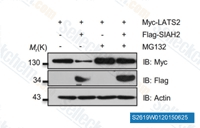
|
|
| S1013 | Bortezomib | Bortezomib is a potent 20S proteasome inhibitor with Ki of 0.6 nM. It exhibits favorable selectivity towards tumor cells over normal cells. Bortezomib (PS-341) inhibits NF-κB and induces ERK phosphorylation to suppress cathepsin B and inhibit the catalytic process of autophagy in ovarian cancer and other solid tumors. |
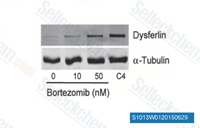
|
|
| S2853 | Carfilzomib (PR-171) | Carfilzomib (PR-171) is an irreversible proteasome inhibitor with IC50 of <5 nM in ANBL-6 cells, displayed preferential in vitro inhibitory potency against the ChT-L activity in the β5 subunit, but little or no effect on the PGPH and T-L activities. Carfilzomib activates prosurvival autophagy and induces cell apoptosis. |
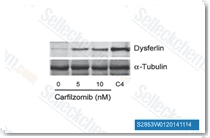
|
|
| S2180 | Ixazomib (MLN2238) | Ixazomib (MLN2238) inhibits the chymotrypsin-like proteolytic (β5) site of the 20S proteasome with IC50 and Ki of 3.4 nM and 0.93 nM in cell-free assays, respectively, also inhibits the caspase-like (β1) and trypsin-like (β2) proteolytic sites, with IC50 of 31 and 3500 nM. Ixazomib (MLN2238) induces autophagy. Phase 3. |
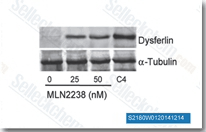
|
|
| S8279 | Shikonin | Shikonin, a potent and specific Pyruvate kinase M2 (PKM2) inhibitor, is a major component of zicao (purple gromwell, the dried root of Lithospermum erythrorhizon), a Chinese herbal medicine with various biological activities. It is also an inhibitor of TMEM16A chloride channel activity using cell-based fluorescent-quenching assay. Shikonin exerts an anti-inflammatory effect by inhibiting tumor necrosis factor-α (TNF-α) and prevents activation of nuclear factor-κB (NF-κB) pathway via proteasome inhibition. | ||
| S7038 | Epoxomicin (BU-4061T) | Epoxomicin (BU-4061T, Aids010837) is a selective proteasome inhibitor with anti-inflammatory activity, inhibits primarily the CH-L activity of the 20S proteasome, while T-L and PGPH catalytic activities are also inhibited at 100- and 1000-fold reduced rate. Epoxomicin promotes apoptosis.Epoxomicin (BU-4061T) can be used to induce animal models of Parkinson's Disease. |
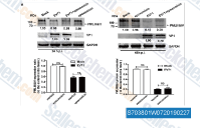
|
|
| S7049 | Oprozomib | Oprozomib is an orally bioavailable inhibitor for CT-L activity of 20S proteasome β5/LMP7 with IC50 of 36 nM/82 nM. Phase 1/2. |
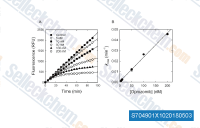
|
|
| S1290 | Celastrol | Celastrol is a potent proteasome inhibitor for the chymotrypsin-like activity of a purified 20S proteasome with IC50 of 2.5 μM. Celastrol induces apoptosis and autophagy via the ROS/JNK signaling pathway. Celastrol inhibits dopaminergic neuronal death of Parkinson's disease through activating mitophagy. |
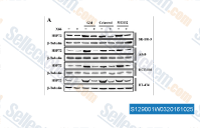
|
|
| S7172 | ONX-0914 (PR-957) | ONX-0914 (PR-957) is a potent and selective immunoproteasome inhibitor with minimal cross-reactivity for the constitutive proteasome in a cell-free assay. |
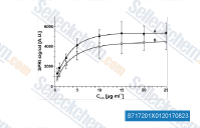
|
|
| S1157 | Delanzomib | Delanzomib is an orally active inhibitor of the chymotrypsin-like activity of proteasome with IC50 of 3.8 nM, with only marginal inhibition of the tryptic and peptidylglutamyl activities of the proteosome. Phase 1/2. |
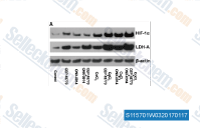
|
|
| S4432 | Ixazomib Citrate (MLN9708) | Ixazomib Citrate (MLN9708) is a prodrug of Ixazomib (MLN2238), which is a selective, orally bioavailable inhibitor of 20S proteasome that inhibits the chymotrypsin-like proteolytic (β5) site with IC50 of 3.4 nM and Ki of 0.93 nM, respectively. Ixazomib (MLN2238) also inhibits caspase-like (β1) and trypsin-like (β2) proteolytic sites with IC50 of 31 nM and 3500 nM, respectively. | ||
| S7933 | VR23 | VR23 is a potent proteasome inhibitor with IC50 of 1 nM, 50-100 nM, and 3 μM for trypsin-like proteasomes, chymotrypsin-like proteasomes, and caspase-like proteasomes, respectively. | ||
| S7504 | Marizomib (Salinosporamide A) | Marizomib (Salinosporamide A) is a novel marine derived proteasome inhibitor which inhibits CT-L β5, C-L β1, and T-L β2 proteasome activities in human erythrocyte-derived 20S proteasomes with IC50 of 3.5 nM, 430 nM, 28 nM. | ||
| S2181 | Ixazomib Citrate (MLN9708) Analogue | Ixazomib Citrate (MLN9708) Analogue is the analogue of Ixazomib Citrate (MLN9708) from WO2016165677A1. Ixazomib Citrate (MLN9708) immediately hydrolyzed to Ixazomib (MLN2238), the biologically active form, on exposure to aqueous solutions or plasma. Ixazomib (MLN2238) inhibits the chymotrypsin-like proteolytic (β5) site of the 20S proteasome with IC50/Ki of 3.4 nM/0.93 nM in cell-free assays, less potent to β1 and little activity to β2. Ixazomib (MLN2238) induces autophagy. Phase 3. |
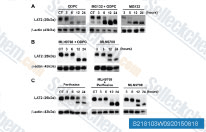
|
|
| S7462 | PI-1840 | PI-1840 is a reversible and selective chymotrypsin-like (CT-L) inhibitor with IC50 of 27 nM with little effects on the other two major proteasome proteolytic activities, trypsin-like (T-L) and postglutamyl-peptide-hydrolysis-like (PGPH-L). | ||
| S3269 | Acetylcorynoline | Acetylcorynoline, a major alkaloid component derived from Corydalis bungeana which is a traditional Chinese medical herb, shows anti-inflammatory properties. Acetylcorynoline may decrease egl-1 expression to suppress apoptosis pathways and increase rpn5 expression to enhance the activity of proteasomes. | ||
| S5813 | Isoginkgetin | Isoginkgetin is a naturally derived biflavonoid with anti-tumor activity. Isoginkgetin directly inhibits the chymotrypsin-like, trypsin-like, and caspase-like activities of the 20S proteasome. Isoginkgetin also is a general inhibitor of Pre-mRNA splicing. | ||
| S6851 | RA-190 | RA190, a bis-benzylidine piperidon, is a potent, selective and oral effective inhibitor of proteasome ubiquitin receptor RPN13/ADRM1 with anticancer activity. RA190 triggers ER stress response, p53/p21 signaling axis and autophagy in multiple myeloma cells. | ||
| E7414New | MG-115 | MG-115 is a potent and reversible inhibitor of proteasomes with ki of 21 nM and 35 nM for the 20S and 26S proteasomes, respectively. It also induces apoptosis in Rat-1 and PC12 cells by selectively inhibiting the chymotrypsin-like activity of the proteasome. | ||
| S2619 | MG132 | MG132 ((S,R,S)-(-)-MG132, Z-Leu-D-Leu-Leu-al) is a potent proteasome (ChTL, TL, and PGPH) inhibitor. MG132 also inhibits calpain (IC50=1.2 μM). MG132 can be used to induce animal models of Parkinson’s disease. |

|
|
| S1013 | Bortezomib | Bortezomib is a potent 20S proteasome inhibitor with Ki of 0.6 nM. It exhibits favorable selectivity towards tumor cells over normal cells. Bortezomib (PS-341) inhibits NF-κB and induces ERK phosphorylation to suppress cathepsin B and inhibit the catalytic process of autophagy in ovarian cancer and other solid tumors. |

|
|
| S2853 | Carfilzomib (PR-171) | Carfilzomib (PR-171) is an irreversible proteasome inhibitor with IC50 of <5 nM in ANBL-6 cells, displayed preferential in vitro inhibitory potency against the ChT-L activity in the β5 subunit, but little or no effect on the PGPH and T-L activities. Carfilzomib activates prosurvival autophagy and induces cell apoptosis. |

|
|
| S2180 | Ixazomib (MLN2238) | Ixazomib (MLN2238) inhibits the chymotrypsin-like proteolytic (β5) site of the 20S proteasome with IC50 and Ki of 3.4 nM and 0.93 nM in cell-free assays, respectively, also inhibits the caspase-like (β1) and trypsin-like (β2) proteolytic sites, with IC50 of 31 and 3500 nM. Ixazomib (MLN2238) induces autophagy. Phase 3. |

|
|
| S8279 | Shikonin | Shikonin, a potent and specific Pyruvate kinase M2 (PKM2) inhibitor, is a major component of zicao (purple gromwell, the dried root of Lithospermum erythrorhizon), a Chinese herbal medicine with various biological activities. It is also an inhibitor of TMEM16A chloride channel activity using cell-based fluorescent-quenching assay. Shikonin exerts an anti-inflammatory effect by inhibiting tumor necrosis factor-α (TNF-α) and prevents activation of nuclear factor-κB (NF-κB) pathway via proteasome inhibition. | ||
| S7038 | Epoxomicin (BU-4061T) | Epoxomicin (BU-4061T, Aids010837) is a selective proteasome inhibitor with anti-inflammatory activity, inhibits primarily the CH-L activity of the 20S proteasome, while T-L and PGPH catalytic activities are also inhibited at 100- and 1000-fold reduced rate. Epoxomicin promotes apoptosis.Epoxomicin (BU-4061T) can be used to induce animal models of Parkinson's Disease. |

|
|
| S7049 | Oprozomib | Oprozomib is an orally bioavailable inhibitor for CT-L activity of 20S proteasome β5/LMP7 with IC50 of 36 nM/82 nM. Phase 1/2. |

|
|
| S1290 | Celastrol | Celastrol is a potent proteasome inhibitor for the chymotrypsin-like activity of a purified 20S proteasome with IC50 of 2.5 μM. Celastrol induces apoptosis and autophagy via the ROS/JNK signaling pathway. Celastrol inhibits dopaminergic neuronal death of Parkinson's disease through activating mitophagy. |

|
|
| S7172 | ONX-0914 (PR-957) | ONX-0914 (PR-957) is a potent and selective immunoproteasome inhibitor with minimal cross-reactivity for the constitutive proteasome in a cell-free assay. |

|
|
| S1157 | Delanzomib | Delanzomib is an orally active inhibitor of the chymotrypsin-like activity of proteasome with IC50 of 3.8 nM, with only marginal inhibition of the tryptic and peptidylglutamyl activities of the proteosome. Phase 1/2. |

|
|
| S4432 | Ixazomib Citrate (MLN9708) | Ixazomib Citrate (MLN9708) is a prodrug of Ixazomib (MLN2238), which is a selective, orally bioavailable inhibitor of 20S proteasome that inhibits the chymotrypsin-like proteolytic (β5) site with IC50 of 3.4 nM and Ki of 0.93 nM, respectively. Ixazomib (MLN2238) also inhibits caspase-like (β1) and trypsin-like (β2) proteolytic sites with IC50 of 31 nM and 3500 nM, respectively. | ||
| S7933 | VR23 | VR23 is a potent proteasome inhibitor with IC50 of 1 nM, 50-100 nM, and 3 μM for trypsin-like proteasomes, chymotrypsin-like proteasomes, and caspase-like proteasomes, respectively. | ||
| S7504 | Marizomib (Salinosporamide A) | Marizomib (Salinosporamide A) is a novel marine derived proteasome inhibitor which inhibits CT-L β5, C-L β1, and T-L β2 proteasome activities in human erythrocyte-derived 20S proteasomes with IC50 of 3.5 nM, 430 nM, 28 nM. | ||
| S2181 | Ixazomib Citrate (MLN9708) Analogue | Ixazomib Citrate (MLN9708) Analogue is the analogue of Ixazomib Citrate (MLN9708) from WO2016165677A1. Ixazomib Citrate (MLN9708) immediately hydrolyzed to Ixazomib (MLN2238), the biologically active form, on exposure to aqueous solutions or plasma. Ixazomib (MLN2238) inhibits the chymotrypsin-like proteolytic (β5) site of the 20S proteasome with IC50/Ki of 3.4 nM/0.93 nM in cell-free assays, less potent to β1 and little activity to β2. Ixazomib (MLN2238) induces autophagy. Phase 3. |

|
|
| S7462 | PI-1840 | PI-1840 is a reversible and selective chymotrypsin-like (CT-L) inhibitor with IC50 of 27 nM with little effects on the other two major proteasome proteolytic activities, trypsin-like (T-L) and postglutamyl-peptide-hydrolysis-like (PGPH-L). | ||
| S5813 | Isoginkgetin | Isoginkgetin is a naturally derived biflavonoid with anti-tumor activity. Isoginkgetin directly inhibits the chymotrypsin-like, trypsin-like, and caspase-like activities of the 20S proteasome. Isoginkgetin also is a general inhibitor of Pre-mRNA splicing. | ||
| S6851 | RA-190 | RA190, a bis-benzylidine piperidon, is a potent, selective and oral effective inhibitor of proteasome ubiquitin receptor RPN13/ADRM1 with anticancer activity. RA190 triggers ER stress response, p53/p21 signaling axis and autophagy in multiple myeloma cells. | ||
| E7414New | MG-115 | MG-115 is a potent and reversible inhibitor of proteasomes with ki of 21 nM and 35 nM for the 20S and 26S proteasomes, respectively. It also induces apoptosis in Rat-1 and PC12 cells by selectively inhibiting the chymotrypsin-like activity of the proteasome. | ||
| S3269 | Acetylcorynoline | Acetylcorynoline, a major alkaloid component derived from Corydalis bungeana which is a traditional Chinese medical herb, shows anti-inflammatory properties. Acetylcorynoline may decrease egl-1 expression to suppress apoptosis pathways and increase rpn5 expression to enhance the activity of proteasomes. | ||
| E7414New | MG-115 | MG-115 is a potent and reversible inhibitor of proteasomes with ki of 21 nM and 35 nM for the 20S and 26S proteasomes, respectively. It also induces apoptosis in Rat-1 and PC12 cells by selectively inhibiting the chymotrypsin-like activity of the proteasome. |
Choose Selective Proteasome Inhibitors
Tags: Proteasome inhibition | ubiquitin-Proteasome system | ubiquitin-Proteasome pathway | Proteasome activity | Proteasome function | ubiquitin-Proteasome degradation | Proteasome assay | Proteasome structure | Proteasome purification | Proteasome inhibitors in cancer therapy | Proteasome cleavage | 20s Proteasome activity | 26s Proteasome structure | Proteasome inhibition assay | Proteasome inhibitor drugs | Proteasome inhibitor review | Proteasomal inhibitor | Proteasomal inhibitors







































